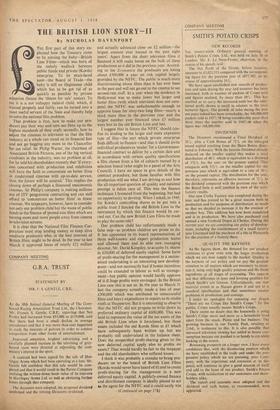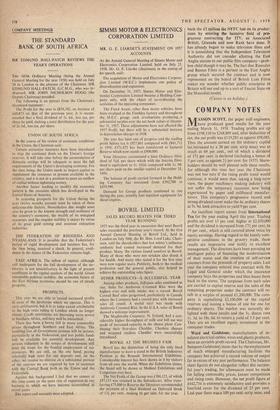THE BRITISH LION STORY-II
By NICHOLAS DAVENPORT That problem is first, how to make our pro- ducers pay their way and turn out films up to the highest standards of their craft; secondly, how to adjust the cinemas to television so that the film industry as a whole can stand on its financial feet and not go begging any more to the Chancellor for tax relief. Sir Philip Warter, the chairman of Associated British Pictures, one of the big vertical combines in the industry, sees no problem at all, for he told his shareholders recently that 'if every- one concerned with production and exhibition will have the faith to concentrate on better films in modernised cinemas with up-to-date service, then the future will be assured.' This implies the closing down of perhaps a thousand uneconomic cinemas. Sir Philip's company is, making millions out of ITV programme contracting and can well afford to 'concentrate on better films' in fewer cinemas. We taxpayers, however, have to consider not only our problem child but the waste of public funds in the finance of second-rate films which are turning more and more people away from cinema to television screens.
It is clear that the National Film Finance Cor- poration must stop lending money to keep alive mediocre producers who, in the best interests of British films, ought to be dead. In the year to last March it approved loans of nearly £21 million and actually advanced close on £2 million—the largest amount ever loaned in the past eight years! Apart from the short television films it financed it will make losses on the bulk of these productions as it did in the previous year. Accord- ing to the Economist the producers are losing about £500,000 a year on risk capital largely provided by the NFFC. The public is much more discriminating about films than it has ever been in the past and will not go out to the cinema to see second-rate stuff. In a year when the tendency in Hollywood was to make fewer but larger and better films (with which television does not com- pete) the NFFC was unfashionable enough to approve loans for sixty-two long films—nearly a third more than in the previous year and the largest number ever financed since £3 million were lent to the old British Lion and lost.
1 suggest that in future the NFFC should con- fine its lending to the larger and more expensive type of film—the sort which private enterprise finds difficult to finance—and that it should invite individual producers to 'tender' for a Government- financed contract to deliver by a certain date and in accordance with certain quality specifications a film chosen from a list of subjects named by a selection board (who might be a panel of the Arts Council). I have no space to give details of the contract procedure, but those familiar with film production will see what I am driving at and how the all-important question of quality and national prestige is taken care of. This was the finance technique I favoured from the beginning, but had no opportunity to develop. When 1 asked, in 1949, for Korda's controlling shares to be put into a public trust I fancied the old British Lion'as the instrument by which this finance would be car- ried out. Can the new British Lion Films be made to play the same role?
Our problem child has unfortunately made a false step—as problem children are prone to do. It has appointed to its board representatives of three well-known and expert production teams and allowed them and its able new managing director, Mr. David Kingsley, to acquire Is. shares in £10,000 of deferred equity capital. Some form of profit-sharing for the management in a nation- alised undertaking is an interesting new develop- ment—and not necessarily bad if bonus incentives could be extended to labour as well as manage- ment—but public opinion would hardly approve of it if huge profits were envisaged. In the British Lion case this is not so. In the year to March 31 last the company actually made a loss of over £300,000 which was attributed to unsuccessful films and heavy expenditure in repairs to its studio roofs at Shepperton. But it is interesting to observe that the NFFC did not propose to write down its preferred ordinary capital of £600,000. This was held to represent the value of the net assets of the old British Lion when it foreclosed, but those assets included the old Korda films at £1 which have subsequently been written up but are probably still undervalued in the balance sheet. Does the unspecified profit-sharing given to the new deferred capital apply also to profits on assets? That would hardly be fair to the taxpayer and the old shareholders who suffered losses.
I think it was probably a mistake to bring pro- ducers on to the board of British Lion Films (Korda would never have heard of it) and to create profit-sharing for the management in a new deferred equity capital. A publicly-owned finance and distribution company is ideally placed to act as the agent for the NFFC and it could easily win
(Continued on page 178)
back the £3 million the NFFC lost on its produc- tions by entering the lucrative field of pro- gramme contracting for ITV, as Associated British, Granada and now Rank have done. It has already begun to make television films and it is astonishing that the Independent Television Authority did not consider allotting the East Anglia station to our public film company—prob- lem child though it may be. The fact that Romulus and Remus Films is a partner in the East Anglia group which secured the contract and is now represented on the board of British Lion Films makes me wonder whether public enterprise in Britain will not end up in a sort of Fascist State on /he Mussolini model.
(Cusios is on holiday.)































 Previous page
Previous page